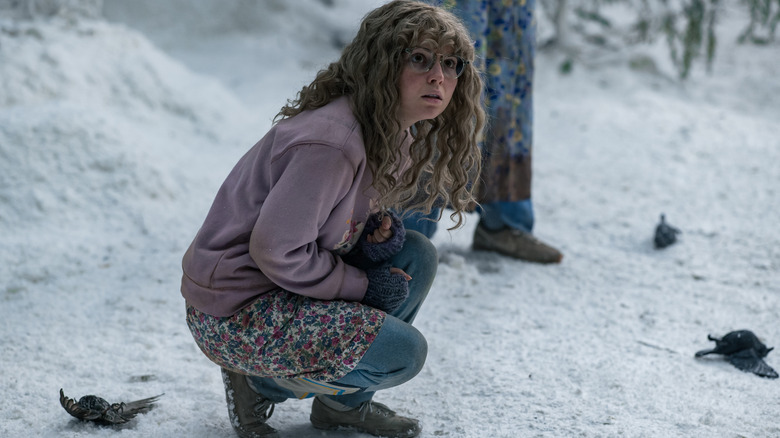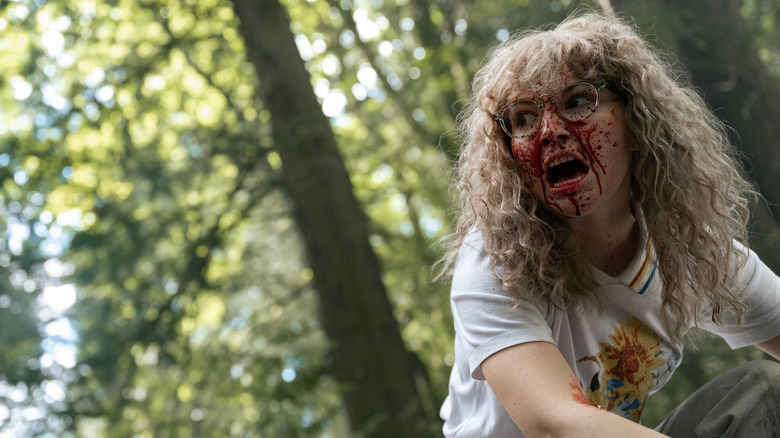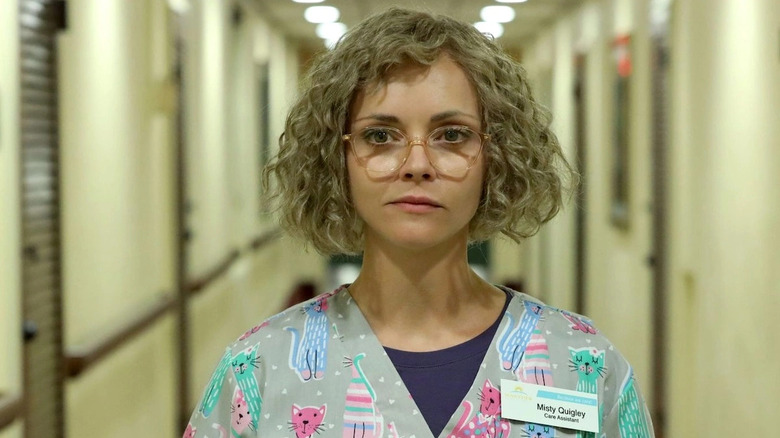Yellowjackets' Samantha Hanratty Knows What Makes Misty So Dangerous
This piece contains spoilers for "Yellowjackets" season 2.
She's been called "twisted," "a villain," "the most terrifying character on TV," and we even named her the most likely member of the "Yellowjackets" ensemble to eat you in the woods ... hold your applause, it's Misty Quigley!
The divisive "Yellowjackets" character played in adult form by Christina Ricci and as a teenager by Samantha Hanratty has certainly committed her share of unspeakable acts. She abducted a journalist and then murdered her when it was revealed she was actually a private investigator. She cut off her coach's leg, destroyed the Yellowjackets' only mode of communication with the outside world mere days after crashing, and most recently, intimidated her only friend off a cliff.
We know that the Misty of the future is shrewd, calculating, and capable of deliberate cruelty, even if that cruelty largely springs from a (sometimes hard to see) well of selfless loyalty to a group of friends that never really appreciated her. But until this past episode, that well of self-effacing devotion is practically all we saw, even in her moments of barbarism. In place of that shrewdness and tendency toward cold calculation was a tragically off-putting abundance of sincerity and lack of intuitive insight into where social boundaries lie.
But in a recent red carpet interview with Entertainment Tonight, Hanratty spoke about the big fall in episode 5 revealed insight into how teen Misty's guilelessness might be developing into the full, devious guile of adult Misty.
Did she jump or was she pushed?
In episode 5, "Two Truths and a Lie," BFFs Misty and Crystal (Nuha Jes Izman) head to a nearby precipice to dump the camp slop bucket, which, for a reason known only to Misty, prompts her to divulge the shameful secret she's kept bottled inside since the series' second episode: that she destroyed the downed airplane's black box. When Crystal grows solemn and nervously informs Misty she has to tell the other girls, it's like you can see a switch flick on in Misty's eyes. She crosses over, briefly inhabiting the state she occupies 100% of the time as an adult as she squares up, stalks toward Crystal, and threatens her into silence with a vow of retributive murder. Then Crystal plummets to her death.
In her interview with ET, Hanratty focused on the brief moments between Misty's confession and transformation, in which she cycles through a roster of intense emotions: panic, betrayal, sadness, anger. "Why she's so taken aback by Crystal's reaction is because it wasn't really something that she was nervous about saying," Hanratty ventured. "I don't think she ever saw it coming to this point." Hanratty nails the quality of Misty's that provides a throughline between her teen and adult forms. However unhinged, however intimidating, Misty always seems to be operating from a place of pure innocence, even ignorance, toward her own motivations.
"I think that's part of what makes Misty so dangerous. She doesn't really take responsibility for the things she does," Hanratty continued, highlighting the non-consensual mushroom dosing of all her teammates. "She doesn't own up to things, which makes her so scary."
The Misty has two faces
Part of what I think makes Misty Quigley such a great character is the murky moral terrain she occupies between more familiar archetypes of "female insanity." On one extreme, you have the innocent victim who's pushed to her breaking point, enacting a kind of self-defense that is construed by an unfeeling public as vindictive and outsized. Then you have the unrepentant psychopath, whose boundless sadism often manifests in diabolical acts of sexual cruelty toward men.
Viewed this way, a well-known cinematic precursor to Misty (although sans that sexual aspect) would be Catherine Tramell in "Basic Instinct," the ultimate lightning rod of the '90s erotic thriller cycle. Think of Jeanne Tripplehorn's desperate cries: "She's evil! She's brilliant!" Like Catherine, Misty continually phases between perceived innocence and perceived wickedness. She also has credible claims to victimhood — namely the intense and unwarranted ostracization her peers inflict on her. Certain ways she has attempted to overcome that ostracization would be virtually impossible to defend in a court of law, a la the mushrooms. And as with Catherine, Misty's darker acts are difficult to adjudicate, because it's unclear how much culpability can really be assigned to her.
Co-showrunner Ashley Lyle shared in that same interview that the team talked about episode 5's climactic fall "a lot in the writers' room," and that "if you watch carefully, she doesn't touch her." If Misty's innocent in her own head, as Hanratty indicated, and if she didn't actually touch Crystal (whose name is actually Kristen), how much of a "danger" is she really? Maybe teen Misty is already on adult Misty's level, and that's the exact kind of question she wants viewers asking. Maybe Misty has us in the palm of her hand — and maybe, for now, we're okay with that.
New episodes of "Yellowjackets" are available in the Showtime and Paramount+ apps on Fridays, and on Showtime on Sundays.


